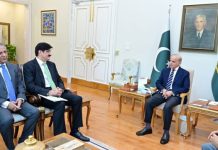By Shakeel Ahmed
ISLAMABAD: The Upper House of the parliament on Monday rejected a bill proposing an increase in the salaries of lawmakers after an intense debate on whether parliamentarians should give themselves a raise in the current economic situation.
Only 16 votes were cast in favour of the Chairman and Speaker (Salaries, Allowances and Privileges) (Amendment) Bill, 2020, while 29 senators voted against it. The ruling Pakistan Tehreek-i-Insaf (PTI), Pakistan Peoples Party (PPP) and the PML-N opposed the bill, citing the country’s weak economy, while the Muttahida Qaumi Movement-Pakistan (MQM-P) and Pakhtunkhwa Milli Awami Party (PkMAP) declared their support.
Further, two other bills including the Deputy Chairman and Deputy Speaker (Salaries, Allowances and Privileges) (Amendment) Bill, 2020 and the Members of Parliament (Salaries and Allowances) (Amendment) Bill, 2020 were rejected through a voice vote.
The Chairman and Speaker (Salaries, Allowances and Privileges) (Amendment) Bill 2020 proposed an increase in the salaries of Senate chairman and National Assembly speaker from Rs225,000 to Rs879,000 to match the salaries of Supreme Court judges and a rise in the remuneration of the Senate deputy chairman and National Assembly deputy speaker to match those of high court judges.
Furthermore, a second bill, sought to increase the salaries of parliament members from Rs150,000 to Rs300,000. It also called for the travel allowance of parliamentarians to be increased to cover the cost of business class air tickets and AC class train tickets.
The draft bill also demanded 25 business class tickets to be allocated for each lawmaker and for the option of these tickets being used by the members’ spouses and children to travel within the country to be available. During the debate in today’s Senate sitting, PPP Senator Sherry Rehman said that considering Pakistan’s current economic situation, it would be tone deaf for the country’s lawmakers to take a pay raise. “This is a very important matter. However, the PPP will reject this bill,” Rehman had said.
“Keeping aside whether this bill is a money bill or not, the role of parliament is to fight for the people. The PPP has always strived in the interests of the most downtrodden segment of society.”
Recognising the fact that the salaries of some lawmakers in Pakistan were among the lowest in the region, Rehman stated: “We understand that there are certain members of the Senate who do not have another source of income and find it difficult to make ends meet. However, this matter should be picked up at another time.”
However, Barrister Mohammad Ali Saif of the MQM-P maintained that those lawmakers who do not wish to take the extra money, don’t have to so. “They are free to donate the money either back to the government or to a suitable charity as they see fit,” he added.
PkMAP Senator Usman Khan Kakar also supported the bill and said that “some senators wanted a raise but were playing politics”.
Kakar said that the salary of parliamentarians is “less than that of a grade-17 officer”. He also criticised Pakistan Tehreek-i-Insaf (PTI) Senator Azam Swati for opposing the bill and said: “People like Azam Swati can afford the expenses of the entire parliament.”
PTI senators had opposed the bill, arguing that the country’s economic situation did not warrant an increase in the parliamentarians’ salaries. Senator Faisal Javed said that the “timing of the bill was not right” and added: “Salaries would be increased once the country’s economic situation improves.”
He pointed out that Prime Minister Imran Khan had “not increased his own salary; parliamentarians should get by”. Swati was also against the bill and said that the salaries of parliamentarians had not been decreased despite an economic slowdown.
The Senate will hold a debate on whether the proposed law classifies as a money bill, in which case, it would be sent to the National Assembly. ‘Need to increase salaries’ On Sunday, Senator Sajjad Hussain Turi PTI’s chief whip in the Senate said that the bill would be scrapped if a consensus could not be reached. Turi, who was elected as an independent candidate and was appointed the ruling party’s chief whip in the Senate last year, had said that those opposing the move were simply playing the “numbers game”.
“There is a need to increase the salaries,” Turi had said, while claiming that almost 85 per cent of the 104 members had agreed in principle to support the bill.
He had added that they would consult various political parties regarding the bill and if a consensus could not be reached, the proposed bill would be scrapped. National Assembly Speaker Asad Qaiser, however, had termed the proposal “unreasonable”, adding that the country had “not come out of the economic crisis yet”.




